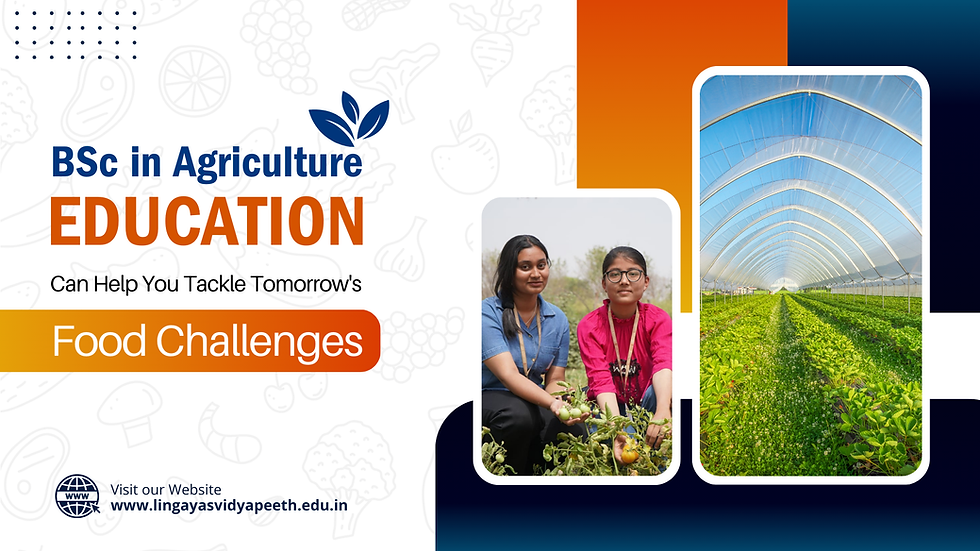How Does B.Sc. in Agriculture Prepare Students for a Career in Agribusiness?
- lingayasvidyapeeth60
- Sep 21, 2023
- 2 min read

B.Sc. in Agriculture is more than just a degree; it's a gateway to a dynamic career in the agribusiness sector. In this article, we'll delve into how B.Sc. in Agriculture provide students with the knowledge, skills, and practical insights needed to thrive in the world of agribusiness. A Best College For B.Sc. Agriculture program that equips students for agribusiness careers. This comprehensive course provides agricultural knowledge, management skills, and hands-on training for success in the industry.
Nurturing Agribusiness Leaders: The Role of B.Sc. in Agriculture
Comprehensive Agricultural Knowledge:
B.Sc. programs cover a wide spectrum of agricultural subjects, including crop science, soil management, animal husbandry, and agricultural economics. This comprehensive foundation equips students with a deep understanding of the agricultural industry.
Agribusiness Management Skills:
B.Sc. courses often include modules on agribusiness management, teaching students about marketing strategies, financial planning, and supply chain management specific to the agriculture sector.
Market Analysis and Trends:
Understanding market dynamics and trends is crucial in agribusiness. B.Sc. programs provide insights into market research, enabling students to make informed decisions about crop selection, pricing, and distribution.
Sustainable Agriculture Practices:
As sustainability gains prominence, B.Sc. courses emphasize eco-friendly farming techniques, conservation practices, and sustainable resource management, aligning students with the global shift towards responsible agriculture.
Technological Integration:
B.Sc. programs incorporate the latest agricultural technologies, from precision farming to digital tools for data analysis. This exposure prepares students to leverage technology for enhanced productivity and efficiency.
Legal and Regulatory Understanding:
Agribusiness is subject to specific regulations. B.Sc. courses cover agricultural laws and policies, ensuring students are well-versed in compliance requirements and ethical practices.
Risk Assessment and Management:
Agriculture is inherently linked with various risks, including weather-related challenges and market fluctuations. B.Sc. programs teach students how to identify, assess, and mitigate these risks.
Entrepreneurship and Innovation:
B.Sc. courses foster an entrepreneurial mindset, encouraging students to explore innovative solutions for agricultural challenges. This mindset is invaluable for those looking to start their own agribusiness ventures.
Networking and Industry Exposure:
Many B.Sc. programs facilitate industry interactions, internships, and field visits. These experiences not only provide valuable insights into the workings of agribusiness but also create networking opportunities with professionals in the field.
Global Perspective on Agriculture:
B.Sc. programs often incorporate a global perspective, exposing students to international agricultural practices, trade policies, and emerging trends, preparing them for careers in the global agribusiness arena.
Conclusion:
B.Sc. in Agriculture is a transformative educational journey that equips students with the multifaceted skills needed to excel in agribusiness. From agricultural expertise to management skills and an entrepreneurial mindset, graduates are well-prepared to navigate the complexities and seize the opportunities within this dynamic industry. As the global demand for sustainable and innovative agriculture solutions continues to grow, B.Sc. graduates are poised to make significant contributions to the agribusiness sector.
Role of Lingaya's Vidyapeeth
Lingaya's Vidyapeeth is Top University in Delhi NCR offers a comprehensive B.Sc. in Agriculture program, meticulously designed to prepare students for thriving careers in agribusiness. The curriculum imparts essential agricultural knowledge, sustainable practices, and agribusiness management skills. With hands-on training and exposure to cutting-edge technologies, graduates are poised to excel in various facets of the agricultural industry. This program equips them to make meaningful contributions to the evolving landscape of agribusiness, addressing global challenges while embracing innovative solutions for sustainable agriculture.








Comments